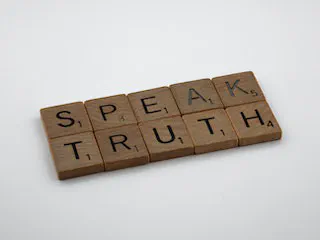
The Importance of Speaking your Truth
- Matthieu P.J.
- Spirituality
- January 18, 2021
Recently, a good friend told me how a challenging business meeting left her with some pain in the back. She had let someone cross her boundaries on that day and her physical pain started the same evening; she was certain that the two were linked. Worse, she mentioned, it was not the first time she felt pain in that particular spot after a challenging day at work.
In saying so, she acknowledged that she had observed that same pattern in the past. She even anticipated after this recent incident that she would ‘pay the price’ and get some back pain.
It is a well-known fact in ancient healing traditions (e.g. traditional Chinese medicine and traditional Indian medicine) that unresolved emotional issues ‘descend’ into the physical body where they manifest as pain. Our health starts in our emotions, and most physical ailments originate in the subtle bodies e.g. the emotional body.
Looking closer, she felt like she had several choices in that conversation with the client, but in the end she was very courteous and did not share her dissatisfaction at the poor way he was treating her on the call. Sure enough, like in the past in similar situations, she suffered physically after having been challenged emotionally.
Does that situation sound familiar to you? Have you ever noticed how some event with a powerful emotional energy can ‘cristallise’ in your body and manifest some physical ailment (usually in the same spot e.g. the back or your throat)? These emotionally charged events that impact your health can happen with anyone; for example: an argument with your partner, a heated debate with a friend, a challenging meeting at work, or some discourtesy by a stranger. Usually, the more you know the person and the higher the perceived stakes, the more you are likely to suffer emotionally and physically.
My friend is very self-aware and she knew there was a moment of choice when she may have taken the ‘wrong’ decision. Basically she could have either:
- Stood for herself and expressed that she was not happy with the way the meeting was unfolding—although she was at risk of upsetting the client and maybe lose a lucrative contract
- Pretended nothing had happened and carried on the conversation—hoping to close the deal and not hurt the relationship with the client
She went for option 2. She was conflicted yet she took what she perceived was the smoothest route. I’ve been there before. These moments of tension, where we know something’s wrong and we’re not quite sure what to do. In an instant we weigh the pros and cons and often go for the route with minimum disruption. And every time I’ve made that choice, I’ve suffered.
The reason I suffered is because I’ve let my logical mind get in charge of my actions, but it tricked me into believing that the path I perceived with the minimum disruption would do me good. My mind used to tell me: ‘you shouldn’t feel like that’. I was feeling guilty about just having these emotions coming through me, so sharing them was a big step ahead. I was not even sure if objectively I had the right to feel that way. And there was the root of my problem. Because it does not matter if it’s real or not, what matters is that it’s how you perceive the events and how you feel them. Many people go to great lengths wondering if they have the right to feel such and such way, if that’s justified etc. But that’s just the logical mind trying to rationalise the feelings. But our feelings CANNOT be processed by the rational mind because they are not the same energy. We always have the right to express our emotions—although sometimes we may choose consciously not to. Emotions are what make us human. But when we fail to express our emotions, we will most likely repress or suppress them (the former means it happens unconsciously, the latter consciously). Either way, we hurt ourselves.
So a common challenge for people is simply to deal with their emotions. You see, feeling friction and being challenged emotionally is never pleasant, but there’s always some lesson behind it. The lesson I’ve learned is that I should always honour my feelings and my truth. I found out that it was absolutely necessary to make my point clear to my audience whenever some misunderstanding arose.
The ego mind tricks us in those moments: we want to minimise damage—or at least perceived damages. It is natural to desire peace and avoid confrontation. When the situation is framed in a professional context for example we can feel a lot of pressure to achieve a certain objective even though it may conflict with our personal values. For example the value of ‘speaking your truth’ comes against the objective of a salesman to achieve their target. And then you are faced with a difficult decision: do you stand for yourself, or do you let it go? And the issue is there: rarely can we let it go. We hold a grudge against the other person, we regret we were too weak to speak up, and we carry that emotional scar with us for some time. We saved the day and an unpleasant confrontation, but at what price! Because on the long run, that hurts us more than anything else. We will feel unsettled for the days to come, we will have a hard time finding our centre and inner peace, we may attract other unpleasant situations to us and we may even experience physical symptoms.
I explained all of that to my friend and she went on asking me ‘So what would you have done in my position?’. I simply said ‘I would have told the person that I felt disappointed at his behaviour.’ Because that’s the truth and it’s factual and nicely said. And sincerely, what could possibly go wrong? You are simply being human and expressing your emotions. You are not responsible for the reactions of others; and as long as you shared how you feel in a calm and positive way, there’s nothing to regret about it. The guy was being cold and robotic in his way of conducting the meeting, and he probably needed to reconnect with his heart because he was disconnected from his own emotions. And that’s often the key to human suffering: unexpressed and unacknowledged emotions.
I’ve worked with large corporations for many years and I’ve witnessed countless stressful situations for myself and my colleagues. The office is such a good school in a way because you will face challenging situations that test you. I used to work with someone who was quite good at navigating office politics but he also gave me that advice ‘Never show emotions in the office if you want to survive.’ For a while I’ve applied that advice. Today I strongly disagree! I’ve witnessed and verified repeatedly how not expressing my emotions can get me ill, and thanks but not anymore.
When I started to realise the spiritual dimension of all the confrontations I attracted on my path, it became clear that there was something for me to learn. What I’ve learned over the years is to trust. Trusting myself, trusting the greater order of things, trusting life. I faced several challenging situations that I managed to address in a positive way. I’ll just share one.
Once I had left a stable job at a large corporation to join a smaller company that offered an attractive compensation but was asking its consultants to be flexible on work location. I had explained that for me the most practical area to commute to was central London and that the projects would have to be based there. In the interviews I had made my point clear and they seemed to agree, saying that shouldn’t be a problem. Fast forward a few weeks, I joined them and after less than 2 weeks it became clear that they wanted me to be based in Luton for the next 12 months. I was furious, angry, disappointed. My emotions were going through a roller-coaster. I saw 3 options: 1/not saying anything and pretending nothing unethical had happened—which was a lie 2/talk to them and try to suggest this situation was not normal or 3/go for a full confrontation and say that this is not what we agreed upon and that I would quit straight away if they did not honour their verbal agreement that I’d work in central London—which honestly is where most of their clients were based anyway. I tested the waters for option 2 talking with my line manager who was absolutely not supportive. Then I went for option 3 the day after. By some kind of coincidence I found myself alone with a managing director at the end of an induction session. During that session he was praising how they company was friendly and ethical and put their employees first etc. I couldn’t agree less. I told him that my personal situation was a total contradiction with what he had been telling the audience for an hour.
We had a calm conversation. Because he had the power of decision, we escalated immediately the discussions: he brought in another director who had interviewed me, he walked outside of the room a couple of times to talk to their legal advisor & HR manager. A long story short, they did not accept my offer to find a middle ground and rectify the situation. 2 hours after I first engaged with the MD, I walked out of the building after having returned my laptop and access badge. As I was entering the lift, the receptionist who had just started to recognise me after 2 weeks uttered a friendly ‘Oh see you soon’ to which I replied with some sadness ‘No you won’t’. I walked out of the office building and felt liberated because I immediately realised I had done the right thing. That same evening when going to bed, I felt so peaceful that I slept like a baby. Shortly before falling asleep, I had the strong feeling that angels were flying around in my bedroom giving me a high five one after another.
Less than 2 months later I started with a new company, one that treated their employees with more dignity and fairness. I did not particularly feel stressed during my job hunt, I just thought I’d take things as they come. What I’ve learned during that experience is that I should always stand for my truth and trust the universe. I took a risk by quitting a job without anything else in sight—and to be fair most people around me were in shock to know I had jumped off the ship after just 2 weeks and cut myself from my only source of income. But I was absolutely sure it was the right thing to do. Some call it taking the leap of faith… Well I took it; and was rewarded for my boldness.
I often think that most people in the similar situation would have been forced to stick around for a couple of months till they get themselves a new job lined up. Actually they would likely have never left at all… When you’ve got kids, a mortgage with hefty repayments and financial obligations, freedom is something very relative. It takes so much time and effort to land yourself a new job that you normally think twice about doing that again in a short amount of time. Since then, I’ve opened the eyes on the fact that some employers do no treat fairly their staff. Under the pretence that they pay them a salary, they believe they can do whatever they want with them. This needs to stop! I have zero tolerance for abuse.
So back to my friend’s story: she listened to me carefully as I explained that past experience I’ve just shared and my gained insights. She felt it was useful to hear my perspective. She started to join the dots. I am sure as I am writing these lines that she reflected further on it so that next time a similar scenario occurs, she will be more aware of the best choice to make.
It’s really not worth getting yourself sick for a job—or anything else in life. You just need to believe in yourself and your worth. Find the right words to talk to the people and explain your point of view. Surrender the fear because focusing on what you may lose is never a good strategy, because you’re totally blind on what you may gain or keep instead: dignity, enhanced personal power and reinforcement of your alignement with your inner values. It’s also important to deliver the message in a kind way. There’s no point getting angry. The situations we encounter in life are there to teach us something. Fear can keep us hostages but only for so long: when we realise the abundance in life—in those examples, an abundance of jobs and clients to deal with—then it becomes absurd to stick around with people who do not match our inner values. Soon enough we’ll attract a better situation with better people!
To my fellow professionals who try to navigate the boisterous waters of the open space with all its complexity, I want to share this: it’s important that you are aligned with yourself in what you do at work. Not to say that everyday should feel like heaven on Earth, because there are ups and downs, but globally the quality of your health is strongly related to how you feel at work. That’s where we spend about 8 hours every day—although that was before the advent of remote working for many thanks to Covid-19—so it DOES matter a lot! I’ve seen too many people staying silent months after months about behaviours and attitudes that were hurting them to finally leaving a job in total burnout and so disillusioned that it will take them weeks or months to recover psychologically. No one deserves that. Act before it’s too late. Honour your truth.


